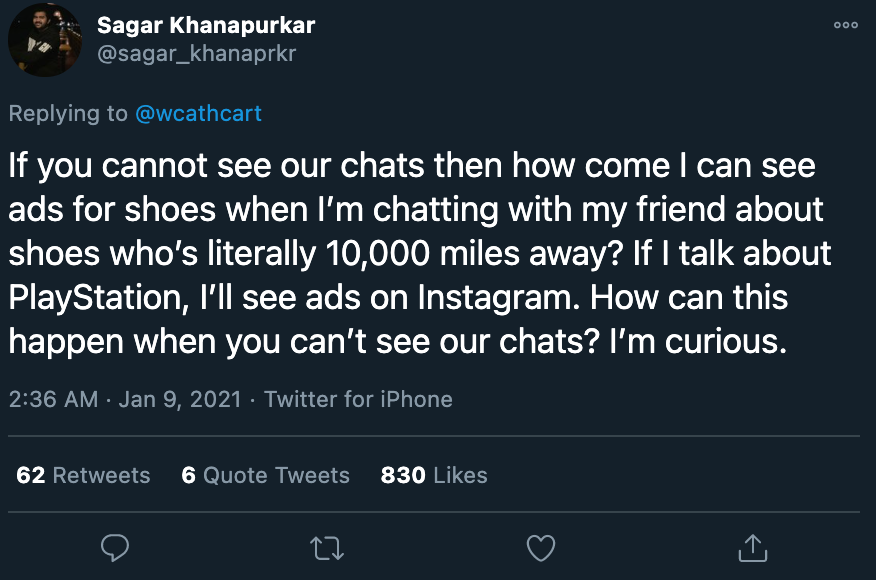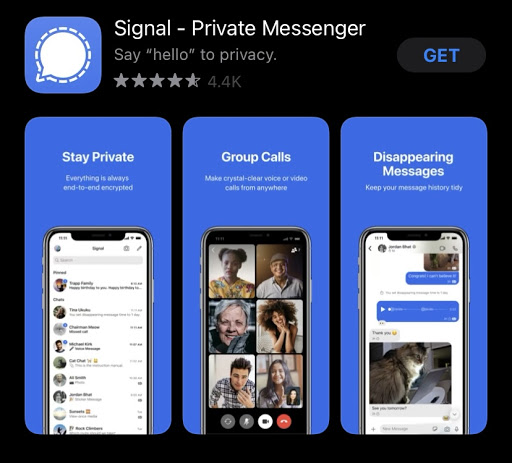The
WhatsApp privacy update was originally scheduled for 8 February but this has been pushed out to 15 May.
In mid-January, data analytics firm Sensor Tower stated
more than 100 000 users installed Signal across the Android and Apple stores. Telegram picked up nearly 2.2 million downloads,” the South African Broadcasting Corporation (SABC) reported.
This indicates
exactly just how serious people are about protecting their privacy — even fake news is enough to scare people away from this popular platform. Countless people have taken to social media, saying that WhatsApp’s new policy means no more privacy. People started debating on Twitter that it is clear in their opinion that WhatsApp does indeed have access to their chats. Take this Tweet for example:

Many people in South Africa have moved to Telegram due to their growing concern that their data and content is being shared with the Facebook products such as Facebook Messenger and Instagram.
It comes as no surprise then that upon downloading Signal on the App store, you will see the welcoming words: “Say ‘hello’ to privacy.”

If you are still using WhatsApp and decide to move over to a new app like Telegram because it offers disappearing messages or group video calls, then the transition makes sense.
But moving away from WhatsApp simply due to stories that just isn’t true could make your life unnecessarily difficult. Not only do you need to convince the people you chat with to move over to the new app, but deleting WhatsApp also means losing all your current messages.
Let’s debunk five myths about WhatsApp’s security update:
1. WhatsApp can read your messages
According to
Emma Sadleir, founder of South Africa’s Digital Law Company, there is no way that WhatsApp will be able to read your messages. This is because it introduced something known as
‘end-to-end encryption’ back in April 2016.
So, what does end-to-end encryption mean? According to Sadleir, when a user sends a WhatsApp message to someone else, the entire message is scrambled in such a way that no one will be able to read it, except for the person who has the ‘key’ to unscramble it. And the only individual with the ‘key’ to unscramble the message is the recipient.
WhatsApp’s privacy policy also states: “
We do not retain your messages in the ordinary course of providing our services to you. Instead, your messages are stored on your device and not typically stored on our servers. Once your messages are delivered, they are deleted from our servers.”
You might be thinking: Of course WhatsApp would say that, but how can we trust them? Well, the legalities regarding this statement are still being looked into by “
The Information Regulator [who] says it will analyse the revised WhatsApp privacy policy to assess whether its terms of service are in compliance with the Protection of Personal Information Act [POPI].”
So, in short, even if you don’t trust WhatsApp, you can trust POPI to have your back.
2. WhatsApp can see your photos
WhatsApp’s privacy policy states, “
When a user forwards media within a message, we store that media temporarily in encrypted form on our servers to aid in more efficient delivery of additional forwards.”
According to Chetan Nayak, contributor for
The Indian Express, “
the app only stores the media temporarily.” Once the image or video has reached the receivers, it will remain only on the devices that it was shared too and not on WhatsApp’s
actual servers.
The only photo that the app has access to is your profile picture, so when you choose an image, just ensure that it’s one that you won't mind WhatsApp having access to.
3. WhatsApp knows and shares your location
WhatsApp only has your
estimated location, thanks to your IP address and your phone number. This means that it doesn’t
actually know where you are, meaning it won’t be able to share your location with anyone else.
This, again, is information that is kept only between the sender and the receiver, meaning WhatsApp and other third parties will not have access to your live location. So, why does the app take note of your IP address and phone number? Well, this is to provide Facebook with information on the areas customers live and what their spending habits are. This way, Facebook can create profiles on their consumers to better understand their consumption habits for advertisers, like taking a look at metrics such as which area a certain group of people fall and what they are interested in, as this can be a usual tactic for marketers and salespeople.
Sadleir says that Facebook needs to make money since it bought WhatsApp for USD$19-billion and a way for them to make money with the platform is with “increased data sharing between Facebook entities”. All this means is that it collects some of your data from WhatsApp, such as your phone number and contact list, but your exact location
isn’t one of those things.
4. WhatsApp has access to my banking details
South Africans don't have to worry about WhatsApp having their banking details because a feature called WhatsApp Pay is not yet available to South Africans.
Wait, what’s WhatsApp Pay? Well, according to
Business Standard this is “
an in-chat [UPI-based] payment feature that allows users to make transactions via WhatsApp to their contact list.”
The closest South Africa has come to this type of service is Telkom Pay, which is an e-wallet service hosted on WhatsApp.
Telkom Pay requires users to simply add them on WhatsApp using 068 483 5566. This means that a user doesn't need to download any other software; all they need is WhatsApp and a phone number.
According to an article by Businesstech, “
Users can add funds to their Telkom Pay Digital Wallet via EFT, Nedbank ATM, or at a Pick n Pay store, while withdrawals are possible from Nedbank ATMs and Pick ‘n Pay.”
Telkom Pay says that it is compliant with the latest security standards and that every registered user will be required to verify their account with their ID number.
When South Africans finally do have the option to set-up WhatsApp Pay, it goes without saying that the app has access to your banking details. Therefore, if you are concerned about your privacy, this new feature might not be for you.
5. WhatsApp can record and track my audio/video calls
This is an obvious concern for
many of the platform’s users, as many private aspects of people’s lives are shared with friends and family members via the video format. For example, during a video call with a close friend, you might be wearing your pyjamas, and you definitely don’t want others to see. The same applies to audio calls, a lot of users like making use of this feature because it uses data or WiFi, meaning that the calls are not as expensive as making an actual phone call.
Well, you can relax. Both video and audio calls on WhatsApp are
also end-to-end encrypted (
see point one: WhatsApp can read your messages). The app can’t ‘unlock’ these conversations because the only person with the ‘key’ is the receiver.
Will Cathcart, the head of WhatsApp, recently tweeted that: “
With end-to-end encryption, we cannot see your private chats or calls and neither can Facebook. We’re committed to this technology and committed to defending it globally.”
Despite these statements, many users are unsatisfied and continue to move their conversation to other platforms such as Signal and Telegram.
What is Signal?Signal is a messaging app that allows you to send messages and make audio and video calls, with added features such as stickers.
Signal describes itself as “a different messaging experience. An unexpected focus on privacy, combined with all of the features you expect.”
What is Telegram?Telegram is also a private messaging app. It sells people on the use of its app by making use of words such as, ‘simple’, ‘private’, ‘synced’, ‘fast’, ‘powerful’, ‘open’, ‘secure’, ‘social’, and ‘expressive’ in its marketing.
It is clear that WhatsApp has some issues, which raises fair concern among users, but information is key in the final decision you make. Stick to the facts and make an informed decision.
What are your thoughts on this issue that WhatsApp is facing? Are you going to stick to WhatsApp? Be sure to let us know in the comments section below.
*Image courtesy of Vecteezy